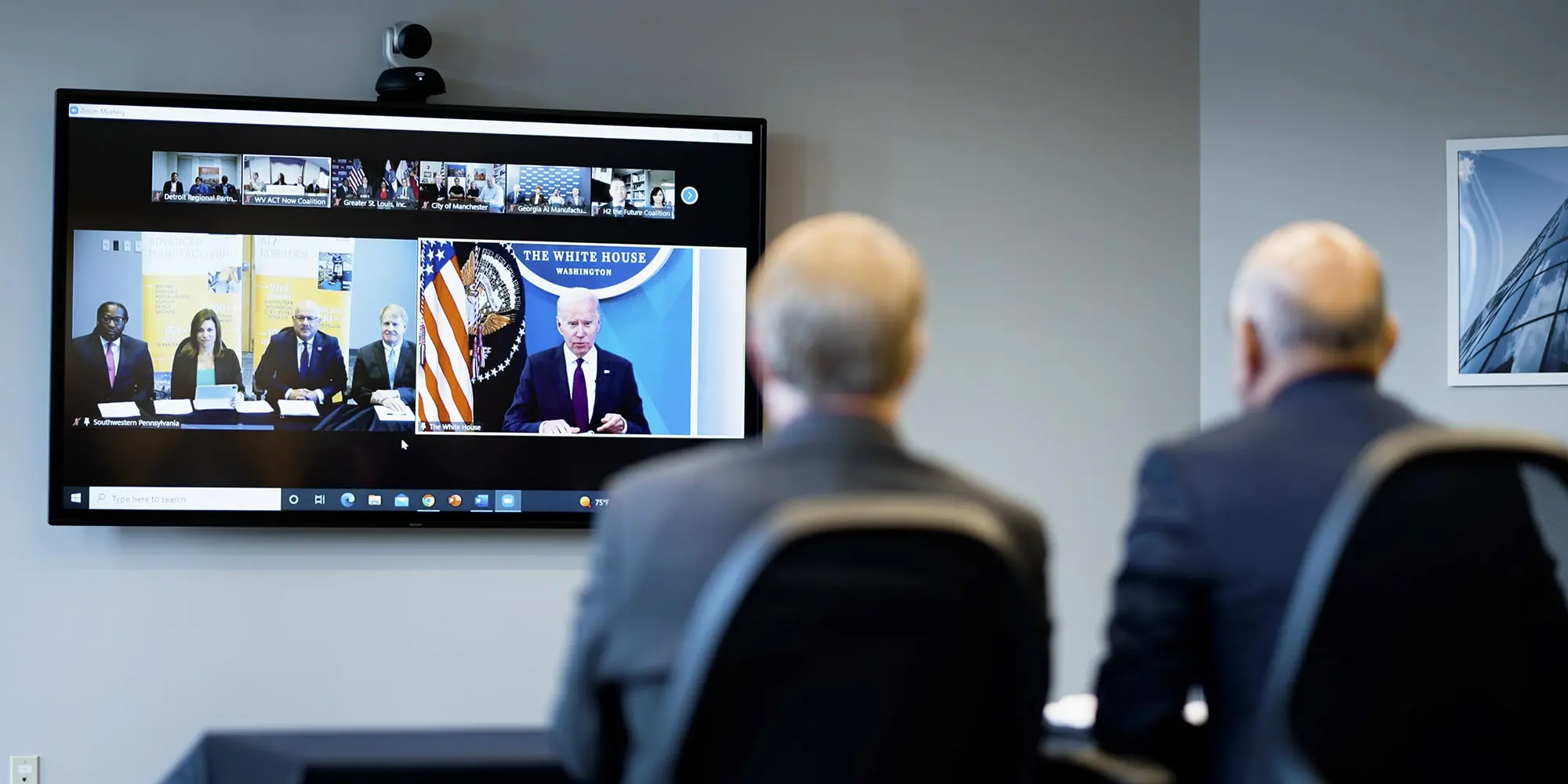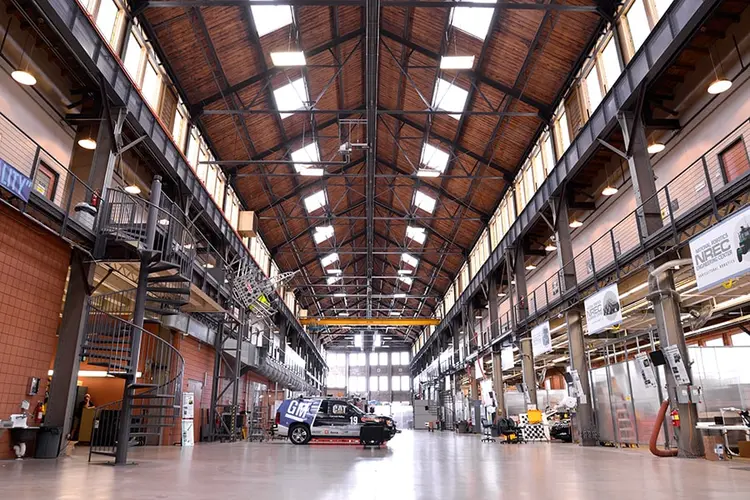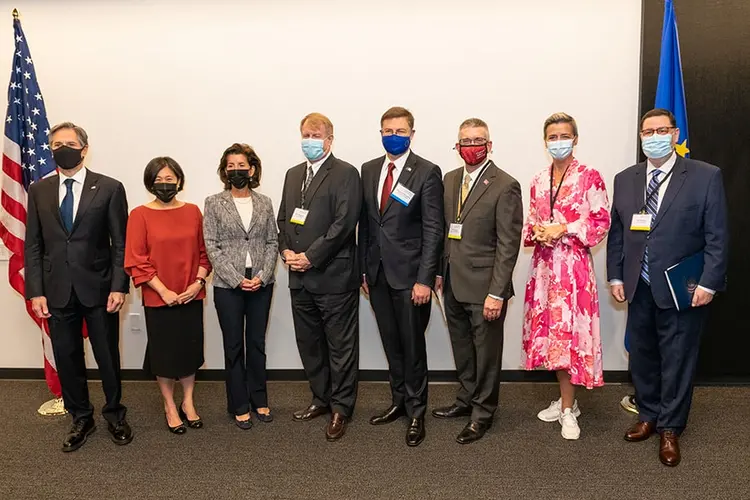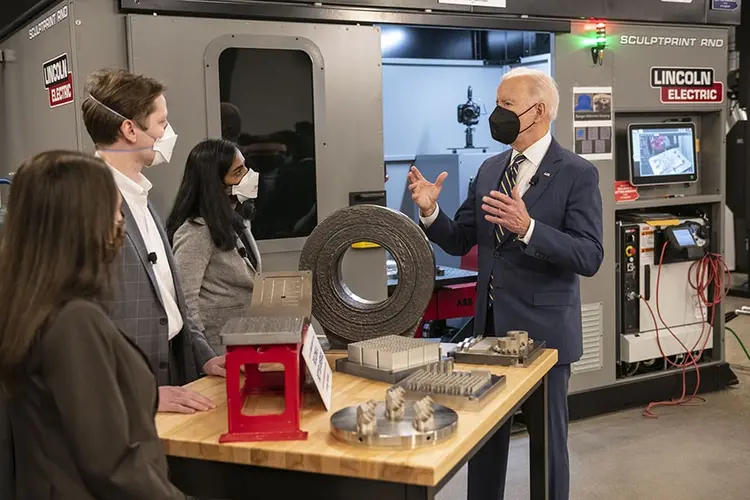
Carnegie Mellon, Region, To Share Benefits of $62.7M Build Back Better Grant
Media Inquiries
Carnegie Mellon University President Farnam Jahanian(opens in new window) joined officials from the Allegheny Conference(opens in new window) and other regional partners in a videoconference with U.S. President Joseph R. Biden for a Sept. 2 announcement that Southwestern Pennsylvania is one of 21 regions awarded a Build Back Better Regional Challenge grant. The region was awarded a $62.7 million grant over four years.
As a global leader in robotics, artificial intelligence (AI) and automation research and technologies, Carnegie Mellon University is the birthplace of transformational innovations in these disciplines, innovations that have ignited a thriving technology industry and revitalized Pittsburgh's economy. Earlier this year, Carnegie Mellon worked with more than 90 partners in the region from the private and public sectors, philanthropy, labor, education and the economic development community to formulate the content of the proposal. Key to this effort were experts from CMU's Manufacturing Futures Institute(opens in new window) (MFI), Block Center for Technology and Society(opens in new window) and Robotics Institute(opens in new window).
Jahanian serves as co-chair of the Southwestern Pennsylvania New Economy Collaborative, the governing board that advised on the application assembly and will oversee and ensure the implementation of the five projects supported by the grant award, along with co-chair Stefani Pashman, CEO of the Allegheny Conference.
In the News
- EDA Newsroom: President Biden To Announce 21 Winners of $1 Billion American Rescue Plan Regional Challenge (opens in new window)
- Pittsburgh Post-Gazette: Southwestern Pa. to receive $62 million boost to build robotics, AI economy (opens in new window)
- WESA: Southwestern Pa. wins coveted $63 million federal grant to spur technology investment (opens in new window)
The proposal capitalized on the Pittsburgh region's distinctive strengths and assets in robotics, AI and automation by applying these technologies to the key sectors of the regional economy — including advanced manufacturing, agriculture, energy, health care and transportation — and by developing a resilient workforce that's trained to successfully work, adapt and grow with these emerging technologies.
The work this grant enables is designed to address challenges the region faces, such as the need to gain access to new supply chains to support our local industries; to equip a regional workforce with skills for the new economy and new pathways to meet the demands of evolving technologies and their applications; to realize greater adoption of robotics and autonomy by the region's largest sectors; and to broaden the accessibility of opportunities in the innovation ecosystem to reach more people of color, women and rural residents.
"Southwestern Pennsylvania winning this significant Build Back Better Regional Challenge grant is a testament to the sheer power of collaboration that's been so integral to the transformation of our regional economy," Jahanian said. "This effort will catalyze new programs and partnerships that share our region's distinctive strengths in robotics, AI and automation with new and small businesses in our key sectors, while elevating and training a more resilient workforce."
"Southwestern Pennsylvania winning this significant Build Back Better Regional Challenge grant is a testament to the sheer power of collaboration that's been so integral to the transformation of our regional economy." — Farnam Jahanian
CMU is playing a key role across all five projects, in addition to receiving funding to implement three of those projects. The regional plan will expand Pittsburgh's well-established robotics, AI and automation cluster to 11 counties in Southwestern Pennsylvania through a strategy that enables:
- Small, medium and family-owned enterprises (SMEs) to access and adopt these technologies and improve competitiveness.
- Workers to upskill and participate in our transforming economy in the coming decades.
- Entrepreneurs to commercialize their technologies and bring new applications to the marketplace.
For Project 1, "SME Technology Adoption," MFI will help meet the goal of bringing robotics and AI to small businesses in other industries and creating customers and supply chains for robotics and AI firms. MFI will support the development and implementation of digital technology assessment models, with a focus on robotics and AI technologies. MFI will also serve as an engineering knowledge resource, promoting the adoption of modernized manufacturing and providing planning and technical assistance support.
As part of Project 3, "Expanded Pathways to New Economy Careers," the Block Center, under its Future of Work(opens in new window) initiative, will engage faculty and collaborators from across campus, including the Robotics Institute and the Simon Initiative(opens in new window), to work with regional project partners in the private sector, workforce development boards and unions to understand their challenges and needs with a focus on improving industry-linked worker training. They will fund projects to develop, test and scale technologies and training interventions particularly suitable to removing barriers to access and success for disadvantaged and underrepresented populations. At the same time, they will fund capacity building programs aimed at equipping regional education and training providers with highly relevant and quality curricula, teaching capabilities, technology and industry connections.
And in Project 5, "Expanded Pathways to Entrepreneurship," CMU will lead a fellowship program for aspiring entrepreneurs and technologists from historically excluded communities. The fellowship will be directed by the Robotics Institute and co-created with industry partners and community organizations like InnovatePGH(opens in new window), Women in Tech PGH(opens in new window), Black Tech Nation(opens in new window) and the Pittsburgh Robotics Network(opens in new window). It will integrate new, diverse talent, including people of color, women and individuals from rural and coal communities, into the region's top-tier robotics and autonomy ecosystem, preparing them to launch companies or enter high-impact positions at existing local companies.
CMU also will be supporting Project 4, the "Applied Robotics Startup Factory," which will be led by Innovation Works(opens in new window) and the Pittsburgh Robotics Network. The Factory will accelerate the formation of startups that harness robotics and AI with support at the pre-launch, launch and growth stage.
The Advanced Robotics for Manufacturing (ARM) Institute(opens in new window), founded at CMU and now operating independently, will lead Project 2, which will see the creation of a "Robotics Manufacturing Hub" at Mill 19(opens in new window) to de-risk manufacturers' adoption of robotics and autonomous technologies and connect them to high-growth companies as suppliers and customers. It will also see the creation of four makerspaces across the 11-county region, as part of a design-for-manufacturing educational and support network linked to all five projects.
"These projects are designed to open doors to anyone who wants to participate in the region's thriving robotics cluster," said Pashman. "This includes expanded opportunities for women and people of color, as well as provide geographic equity throughout the region. The grant also puts a plan in motion for the adoption of robotics and AI technologies across a vast portfolio of existing businesses — of every size and in all corners of the region — and seeks to leverage our base of manufacturers to build robust local supply chains."
Jahanian concluded, "By expanding the geography of these innovations, Carnegie Mellon is thrilled to work with partners to broaden accessibility to our nation's technologically driven economy to all in our region."
— Related Content —

National Robotics Engineering Center Has Economic Impact



